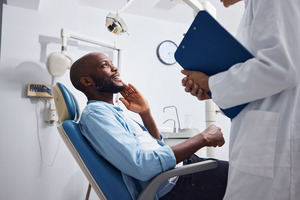
When people have their teeth extracted, they’re often fairly nervous about what the procedure will entail and what they should expect. However, they’re also usually comforted once they actually get the procedure; they’ll usually find that removing the tooth was fairly painless, and that the procedure wasn’t nearly as intense as they had feared.
Really, the only thing that might trip you up is aftercare. In particular, a condition called dry socket can seriously derail your recovery if you aren’t careful. Here’s more information about this condition, as well as what you can do to avoid it affecting you.
What Is Dry Socket?
In the days after your tooth extraction, your body will work to form a large clot in the socket left by the procedure. This protects the sensitive interior of the tooth, allowing healing to progress quickly and easily.
However, under some circumstances, the clot can be pulled out of place. This is known as dry socket, and the condition can seriously hinder the body’s ability to heal effectively after your treatment.
What Causes Dry Socket?
There are a few things that can potentially pull your clot out of place, the most common of which is suction. Creating any kind of suction with your mouth can potentially disturb the wound.
It’s also possible to push the clot out of place, particularly if you’re chewing vigorously with that side of your mouth, or if you’re playing with the wound absent-mindedly.
How to Avoid Dry Socket
The best way to avoid dry socket is to keep in mind what can cause the condition and how you can steer clear of it. Here are a few things that you ought to refrain from doing:
- Don’t drink anything through a straw
- Don’t smoke or vape
- Refrain from spitting excessively
- Don’t Chew on the Side of your Mouth with the Wound on It
- Avoid playing with the wound.
Ultimately, dry socket will only happen if you allow it to. So long as you diligently follow aftercare instructions, you’ll recover quickly after your tooth extraction.
About the Author
Dr. Admasu Gizachew knows that dentistry can sometimes be stressful for patients, which is why he makes it a point to be someone that his patients can rely on no matter what problem they could have. Whether it’s a tooth extraction, orthodontics, or just routine dental care, he gives nothing less than his best. Dr. G received his dental degree from New York University and completes over 300 hours of continuing education each year.
If you have any questions about a tooth extraction, he can be reached at his website or by phone at (718) 841-0920.
